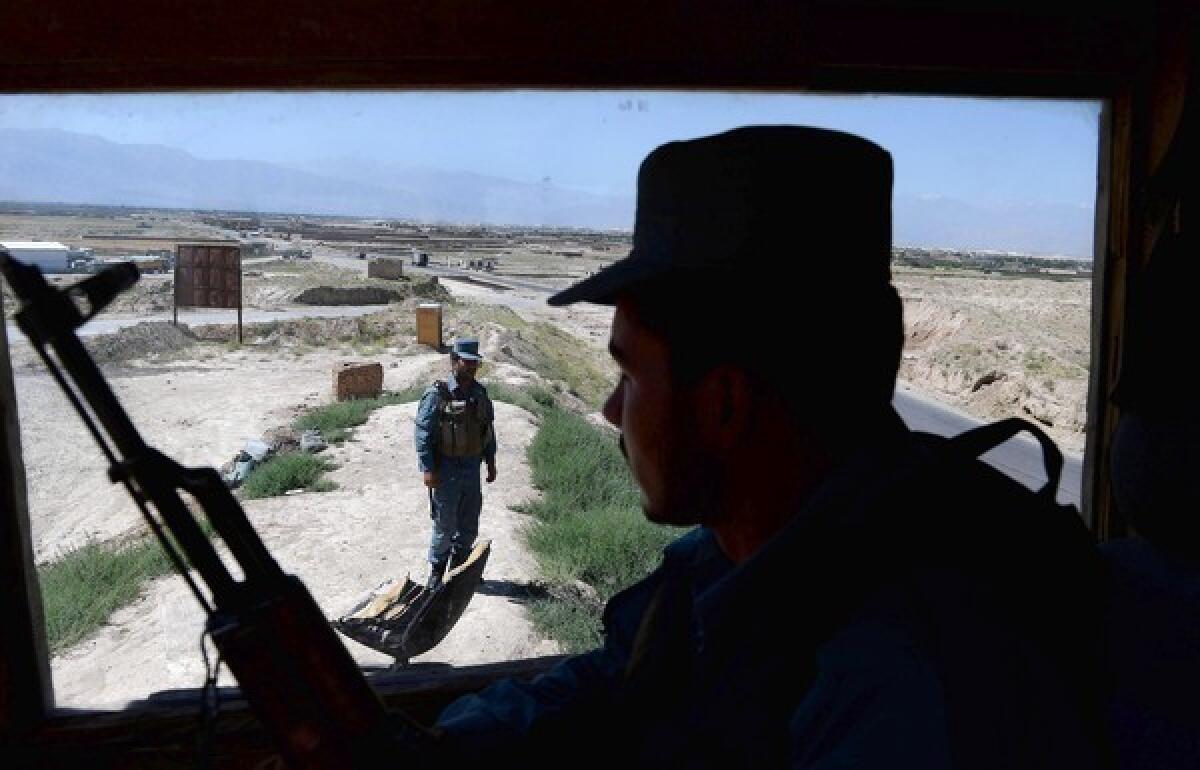Afghan Taliban makes politically savvy moves

- Share via
KABUL, Afghanistan — Even as Afghan President Hamid Karzai this week canceled security negotiations with the Obama administration and suspended his involvement in the U.S. attempt to revive peace talks with the Taliban, the insurgents made some political moves as fleet-footed as some of their guerrilla tactics, analysts said.
This comes as Afghanistan’s neighbors rethink how their interests would be affected by a political reconciliation involving the Taliban, as much of a long shot as that seems.
“It’s early days, but India’s watching this very carefully,” said Rana Banerji, a New Delhi-based Central Asia expert and former Indian Cabinet Secretariat intelligence official. “The Taliban’s moved on, become pretty sophisticated. Their media management is quite good, they’re Internet savvy, things have moved on from 1996.” That was the year they assumed power in Afghanistan, only to be driven out by U.S.-led forces in 2001.
But the hard-line Islamic group also remains a tough military adversary with no sign of letting up, as seen Tuesday night by a rocket attack on the Bagram air base outside Kabul that killed four Americans.
U.S. talks with the Taliban were widely expected to start Thursday. But that didn’t happen, possibly because of Karzai’s displeasure.
In another development, a senior Taliban official on Thursday offered to trade an American soldier held since 2009, Army Sgt. Bowe Bergdahl of Hailey, Idaho, for five senior Taliban operatives imprisoned at Guantanamo Bay, Cuba, as a “conciliatory gesture,” according to the Associated Press.
In a bid to mollify Karzai and put fragile U.S.-Afghan relations back on track, Secretary of State John F. Kerry called the Afghan leader twice within 24 hours. Karzai expressed concern that his administration could be sidelined in the peace talks and lashed out at Washington for what his office termed without elaboration the “contradictory” U.S. behavior toward Kabul.
He also expressed his displeasure over a sign at the Taliban’s newly opened office in Doha, Qatar — where the talks are expected to be held — that read “Islamic Emirate of Afghanistan” and a display of the Taliban’s white flag, which suggested that the insurgent group represented Afghanistan.
In the calls, Kerry reassured Karzai that the sign and flag had been removed, State Department spokeswoman Jen Psaki told reporters in Washington, though news reports from Doha on Thursday indicated that the flag was simply lowered so it would not be visible from the street. In a statement, the Karzai administration asked Kerry to publicize the fact that the sign had been removed.
“The phone call may settle down President Karzai a little bit,” said Jawed Kohistani, a Kabul-based analyst. “But in general the name of the Taliban’s Qatar office received a very negative reaction.”
State Department officials said Thursday that the beginning of talks in Doha had been held up to coordinate the travel plans of the U.S. diplomat who will attend the talks, James Dobbins, and Kerry, who also is visiting the Qatari capital in the next few days on a separate mission.
Although the Taliban was pressured to holster its sign and flag, it succeeded in putting Karzai on the defensive with public relations antics and showmanship. At the office opening ceremony Tuesday, Taliban representatives were in the spotlight, cutting ribbons and speaking of the need for international cooperation.
This is part of a broader Taliban image makeover, analysts said. The militants have softened their opposition to secular education and video technologies they once vehemently opposed as un-Islamic and embraced social media, frequently used to exaggerate the effectiveness of their attacks against international and Afghan forces or to take credit for attacks they didn’t plan. Their website now issues news releases in five languages, complemented by a Twitter feed with more than 8,000 followers.
At a conference in December with Afghan officials, Taliban representatives expressed a willingness to share power and grant more rights to women, allowing them to choose their husbands, own property, attend school and hold jobs, all rights denied during Taliban rule.
Whether this is heartfelt or mere window dressing in an effort to better appeal to an increasingly educated and worldly Afghan electorate remains to be seen. Also unclear is how representative these initiatives are of different factions and generations in the Taliban.
The hint of Taliban talks is causing Afghanistan’s neighbors to sit up and listen. A Pakistani Foreign Ministry official said Wednesday that any reconciliation that might bring security to the region would be welcomed. Indian Foreign Minister Salman Khurshid echoed this view, but said any initiative shouldn’t violate “red lines” drawn up by the international community, including that the Taliban should have no links to the Al Qaeda terrorist network.
The Taliban’s offer of better international relations reflects its growing confidence in the face of a Karzai administration on its heels and a North Atlantic Treaty Organization whose appetite for a fight is diminishing as foreign combat troops prepare to leave by late next year.
It’s also part of a sophisticated strategy of outreach to different countries, some for humanitarian aid, others because of a shared interest in checking U.S. influence, such as China, Russia and Iran, or because of their willingness to fund the movement’s Islamist agenda, and still others for intelligence that serve military objectives, said Kohistani, the analyst.
“The Taliban vision is not 2013 or 2014, but beyond 2015,” he said. “The Taliban are trying to get rid of the international and especially U.S. sanctions and get their names removed from the black list. And they want political power in Afghanistan.”
Special correspondent Baktash reported from Kabul and Times staff writer Magnier from New Delhi. Staff writer Paul Richter in Washington and special correspondent Nasir Khan in Islamabad, Pakistan, contributed to this report.
More to Read
Sign up for Essential California
The most important California stories and recommendations in your inbox every morning.
You may occasionally receive promotional content from the Los Angeles Times.













